One key to understanding Van Til's thought is the irrational-rational synthesis. What does Van Til mean by "rationalism", and what does he mean by "irrationalism"? The irrational-rational synthesis is Van Til's attempt to generalize how unbelievers think in principle (what their epistemology looks like), keeping in mind that they're not always consistent with their unbelieving principles due to God's common grace. James J. Cassidy in "The Essential Van Til — God not God" describes Van Til as a master at exegeting unbelief (understanding the unbeliever in a Biblical way). Therefore, understanding the irrational-rational synthesis should prove beneficial for Christians of all walks of life.
In summary: Unbelief is rationalistic, because it insists on the autonomy of human thought, and therefore insists that human thought is the ultimate criterion of truth and falsity, of right and wrong. On the other hand, unbelief is also irrationalistic, because it believes that the apparent order in the universe is ultimately based on disorder, upon chance. - John Frame (Van Til: A Reassessment)

Such a generalization might seem unwarranted because after all, there are countless forms of unbelief circulating today. Frame, however, indicates that Scripture does provide some warrant for Van Til's attempt at generalization as, according to Scripture (Romans 1:18-32), all unbelief is at least united in one thing - their desire to suppress the truth of God's revelation [1]. With this in mind, let's see if we can unravel the way in which Van Til generalized all unbelieving thought.
The Christian position
One way to start the process of determining the general structure of unbelieving thought is to determine beliefs that directly or indirectly negate the Christian worldview. One key belief that denies the Christian worldview is the denial that the Biblical God is the sovereign ruler of all things, and that he is the supreme authority over human thought and life [2]. Another way of stating this is that the Christian asserts the Creator-creature distinction, whereas the unbeliever does not.
Van Til mentions this in Introduction to Systematic Theology chapter 14 when he writes:
[We may never subvert] of the clear teaching of Scripture on the all-controlling if ultimate and mysterious power of God. The moment a Christian theologian admits that anything happens in the whole course of history, whether by devil, or man, or power of nature, without the will of God, that moment the foundations of a Christian theology are shaken. For to admit that anything happens outside the will of God is to admit the pagan notion of chance. God by his plan controls whatsoever comes to pass.
Van Til, An Introduction to Systematic Theology.
Hence, the Christian holds that no fact can "appear" that can somehow disprove the ultimacy and sovereignty of God over all of life and what He has revealed of Himself and the world through His Word. The meaning of every fact is therefore exhausted by its relation to the plan of God (the circle). For any fact to be a fact at all, it must be what Scripture says it is.
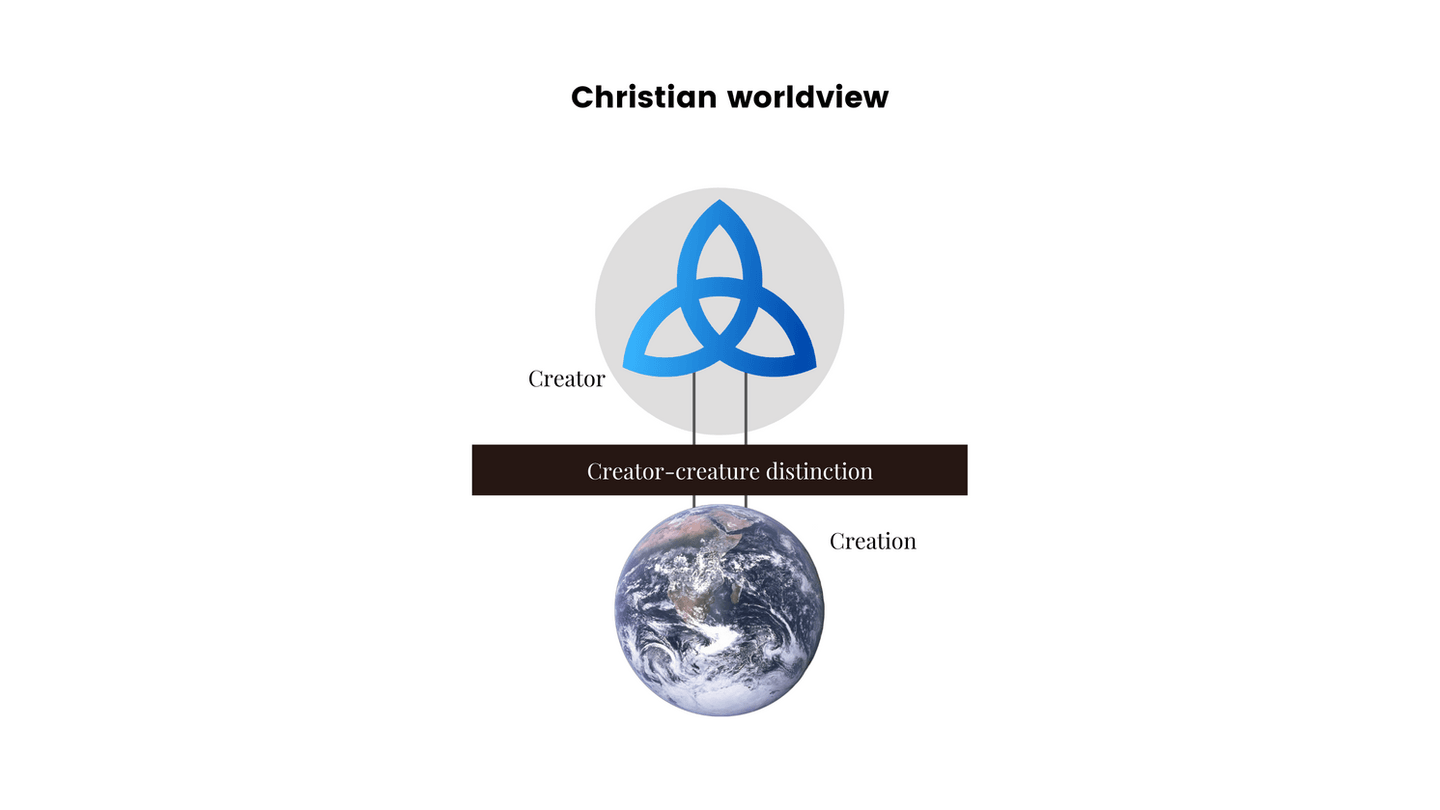
The idea is that if you deny the Creator-creature distinction by asserting some ultimate principle of chance (or brute fact), it would be the same as holding that the universe is ultimately meaningless (as the product of pure chance). Hence, God, if He exists, would also be encapsulated in some sort of mystery that surrounds both Him and man - as somehow things happen / exist / come into existence / find their meaning in principles that are outside of his control.
This brings us to "irrationalism" and "rationalism". Van Til uses these two words in somewhat new ways (e.g. with rationalism he does not mean epistemological rationalism [truth is arrived at by thinking with the mind rather than sense perception] usually contrasted with empiricism [truth is arrived at via sense perception]). Frame reckons in "CVT: An analysis of his thought" that the irrationalist-rationalist synthesis is Van Til's greatest contribution as it:
Is scripturally based on its accurate account of the Christian worldview and the unbeliever's negation of it.
Is confirmed by analyzing the secular texts.
Gives insight into the structure and dynamics of intellectual movements.
The rationalist-irrationalist approach works on the assumption that the distinction between the Creator and the creature is not basic. If this distinction is introduced at all [by unbelievers], it is introduced after the attempt is first made to predicate about being in general by means of laws of logic in general.
Van Til, The Reformed Pastor and Modern Thought
Irrationalism
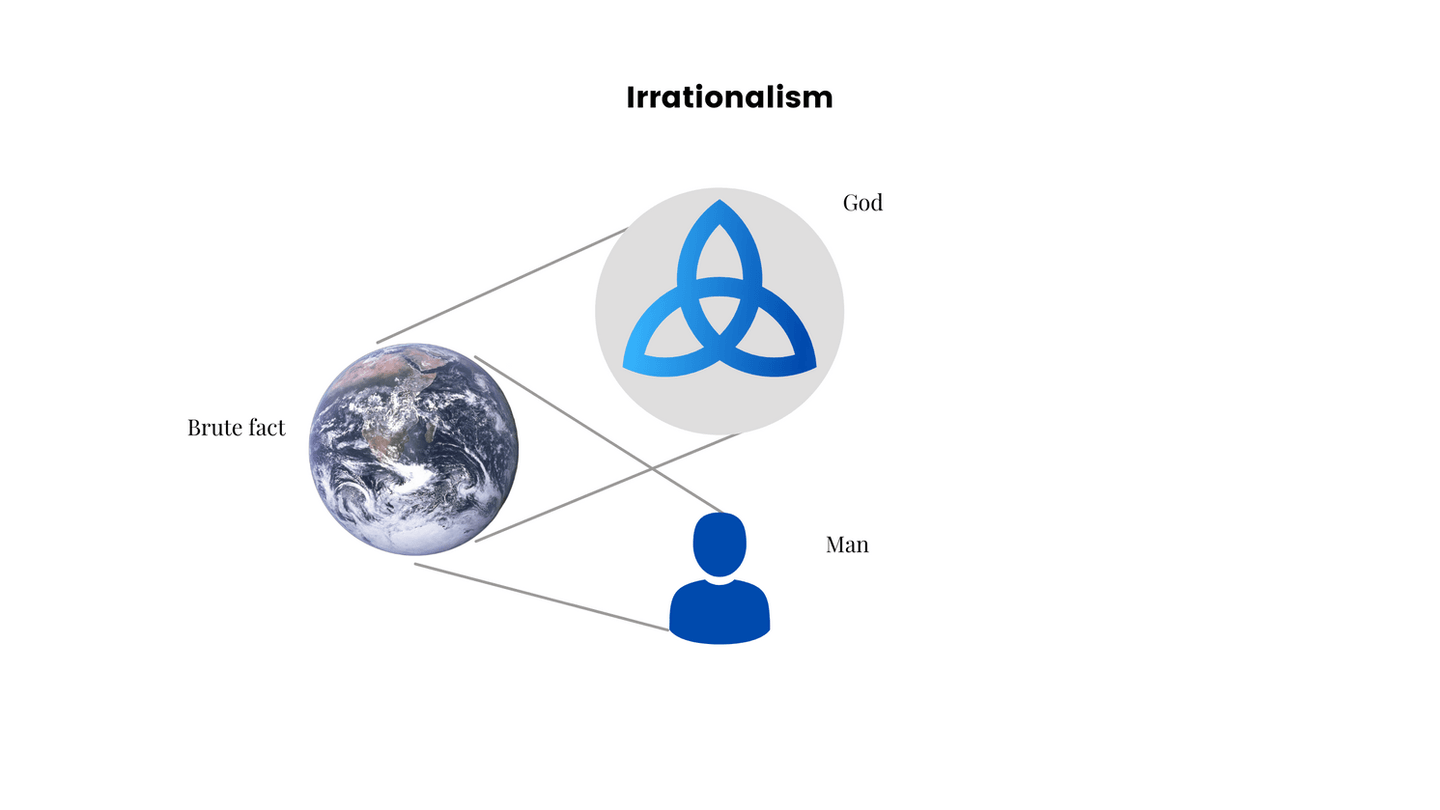
Irrationalism rejects any form of ultimate authority and therefore must have chance as its ultimate basis. If there is no God back of time and history whose plan is absolutely necessary, then chance must rule supreme [3]. Think about it. As Christians, we believe that our self-contained God is the final reference point of everything created. On account of his counsel, creation, control, governance, and providence as well as his interpretation, every fact as well as the plan of the universe is precisely what it is. Every fact, the relations between facts, the plan of created reality, all display this and are, in other words, revelational of God [4]. The unbeliever, who "denies that the Biblical God is the sovereign ruler of all things" as mentioned earlier, denies that every fact in the universe is what it is because of the governance, providence, and interpretation of God.
The only other option for origin facts that somehow find their meaning outside of God's governance, providence, and interpretation is chance. These facts are brute, or uninterpreted, facts.
Van Til explains:
It is this conception of the ultimacy of time and of pure factuality on which modern philosophy, particularly since the days of Kant, has laid such great stress... It has become customary to speak of post-Kantian philosophy as irrationalistic. It has been said that Kant limited reason so as to make room for faith. … In the first place the irrationalism of our day is the direct lineal descendent of the rationalism of previous days. The idea of pure chance has been inherent in every form of non-Christian thought in the past. It is the only logical alternative to the position of Christianity according to which the plan of God is back of all.
Van Til, Christian Apologetics, 163-64.
Rationalism
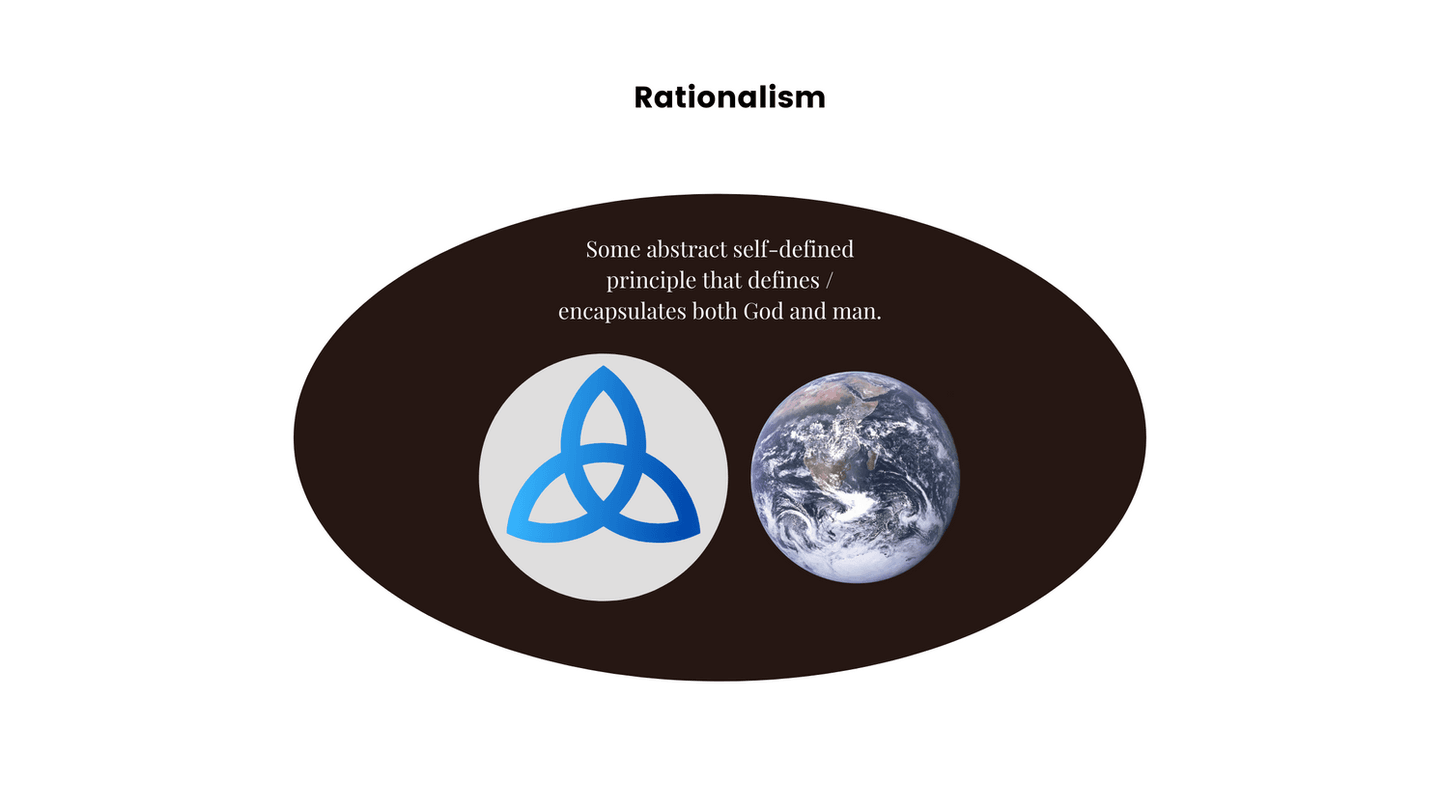
John Frame defines Van Til's use of rationalism in this context as "Belief that human reason (seen as the whole apparatus of human thought, including sensation, memory, etc.) is the ultimate arbiter of truth and falsity." [5]
In other words, human reason can determine (legislate) what is true, and what is false wholly (or at least partially) apart from reference to God. That is to say, we can interpret reality correctly and arrive at its proper meaning and place without needing to relate our experience of reality to God's governance, providence, and interpretation of His creation. This means that the laws of thought (i.e. the law of non-contradiction) are elevated as an abstract law that the human mind can use to legislate reality (including God Himself), rather than viewing the law of non-contradiction as a finite reflection of God's self-consistency we use to order the facts of experience analogically, with God Himself being the determiner of possibility and impossibility.
Van Til illustrates rationalism at the hand of an example.
We may illustrate [rationalism] by a reference to Socrates. Socrates answers the question whether the holy is holy because it is holy or whether it is holy because God says it is holy, by saying that he does not care what the gods say about the holy. He wants to know what the holy is in itself. In other words, he assumes absolute human autonomy. By saying this he, at the same time, answers the question asked. The Holy is holy not because a god says it is holy; the holy is a concept and a reality that stands above the gods as well as above men. This is rationalism
Van Til, The Sovereignty of Grace: An Appraisal of G. C. Berkouwer’s View of Dordt
Therefore, rationalism is closely linked to abstract reasoning, where the one is emphasized over the many (to understand this, check out our article on the one and the many). Some concepts (e.g. holiness, justice, good, evil) find their definition wholly apart from God, but rather end up giving definitions to both God and man.
Irrationalism-rationalism at the fall
Perhaps the best illustration of the irrationalist-rationalist synthesis comes from the Bible. (To read the contents of this section from a different angle, check out Should we blindly believe the Bible?)
Before the Fall, God gave Adam and Eve a command:
The Lord God took the man and put him in the garden of Eden to work it and keep it. And the Lord God commanded the man, saying, “You may surely eat of every tree of the garden, but of the tree of the knowledge of good and evil you shall not eat, for in the day that you eat of it you shall surely die.”
Genesis 2:15-17, ESV
If we continue reading Genesis 3, we see Satan entering the picture. First Satan twisted God's Words, and thereafter he flatly contradicted them. Eve was now sitting in a dilemma. According to God, if she were to eat from the tree of knowledge of good and evil, she will die. According to Satan, if she were to eat of the very same tree, she will not die, but become like God. We have two mutually exclusive statements about reality that cannot both be true. Having thus been deceived by Satan, Adam and Eve at of the fruit and the rest of redemptive history follows. Thus, Adam introduced the notion of human autonomy and with it the rationalist-irrationalist synthesis that has marked all human thought that is not redeemed by Christ [6].
Like an irrationalist, the serpent presented his claim to Eve as a hypothesis that can only be confirmed via experience. This is to present the idea of brute, uninterpreted fact. Nor Satan nor God has an authoritative interpretation of the tree, therefore the only way to test Satan's hypothesis is via experience.
Satan first assumed and asked Eve to assume that facts are brute facts. On the basis of this assumption he then asked Eve to accept his hypothesis as being no less relevant than God’s hypothesis. He said in effect that he did not ask Eve to be unfair to God; he wanted her to consider God’s hypothesis no less than his own, and his own no less than God’s.
Van Til, The Articles of Cornelius Van Til.
No one had as yet had any experience with eating of this tree; there were no inductively gathered records to indicate even as much as a tendency to evil being involved in the use of the fruit of this tree. It was the “inductive method” with its assumption of ultimate mystery involved in pure possibility that Adam introduced. This was utter irrationalism. It was therefore by implication a flat denial of God’s being able to identify himself.
Van Til, A Christian Theory of Knowledge.
Like a rationalist, the serpent told Eve that by reflecting on her own capacity for selfishness she may deduce that God restricted access to the tree for selfish reasons [7].
But there is another side to the story of the fall of man. How could man be sure that he could safely ignore the command of God? How did he presume to know that God did not know what would come to pass should he eat of the forbidden tree? If there was to be any seeming sense to such an action, it would have to be on the assumption that man himself knew that the evil threatened would not take place.
Satan told man that the issue would be quite otherwise than God said it would be. He said that God knew that it would be otherwise. Satan suggested that God too knew that man would be as God, knowing good and evil if man should eat of the tree. Reality, said Satan in effect, is wholly lit up, lit up for the “creature” as well as for the “Creator.”
Man therefore does not need to live by the authoritative assertions of the Creator. He can discover by his own independent inspection... what will take place in the course of time. Man as well as God can ascertain the laws of being by means of the laws of rationality in his mind. Is not the law of rationality in the minds of men and of gods ultimately one with the law of being in reality as a whole? Surely reality cannot be “deeper than logic”.
Van Til, A Christian Theory of Knowledge
We first note that Satan flatly contradicts God's Words: Not only will Adam and Eve not die when they eat the fruit, but they will be like God. He also mentions that God knows it would be otherwise than God initially stated (hence, according to Satan, God is a liar).
Therefore, Satan tells Eve that he is quite able to know the truth of the tree apart from God's authoritative assertion with regards to the tree - and by implication so can man. The laws of rationality (e.g. the law of non-contradiction) are "as deep as you can go" in the search for truth standing even above the Word of God.
Hence, Eve bought into the rationalistic system of Satan, viewing herself as sufficient to know the world around her truly without the authoritative guidance of her Creator.
It was thus that man, in rejecting the covenantal requirement of God became at one and the same time both irrationalist and rationalist, and the synthesis enters.
We see then that irrationalism and rationalism are not opposed to each other, except formally. They actually serve each other and actually imply one another. To be either one, you need to be both. Consider: once you reject God's providential plan and sovereign control over the facts of experience (objects) and yourself (subjects) - which is irrationalism - all that would be left is absolute chaos of unrelated brute facts. Hence, the human mind takes the place of the Creator and starts imposing its own system onto the facts - which is rationalism [8].
We now turn to briefly look at some major historical figures to see how the irrational-rational synthesis can be seen in their thought. According to Van Til, the main question that can be asked about any system of thought is whether it is man-centred or God-centered. Does it make the Creator-Redeemer or the creature the final reference point in predication? (In other words: Does it hold God's plan at the back of all facts, with man as a reinterpreter of God's facts, or is it a synthesis of irrationalism and rationalism?).
Note that we'll be painting with a very broad brush in the following sections.
Irrationalism-rationalism in Plato
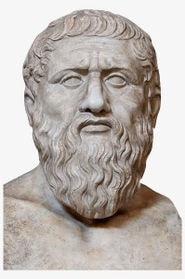
Plato (470–399 bc) is probably the most popular philosopher of the ancient world. Few men have had and will have the impact that the intellect of Plato had in the world. Although Platonism itself isn't a philosophy held by the common man, the history of philosophy is sometimes described as a footnote to the work of Plato [9].
Plato distinguished between a “world of Forms” and a “world of change.” The latter is the world of our experience where everything is constantly changing. But how can we know anything if everything is constantly changing / new (irrationalism)?
Plato’s answer is that we can know the world of our experience because it is related to a higher world, the world of Forms. This higher world contains unchanging standards which serve to define objects in the world of change. We can identify a tree in our experience because although it is constantly changing it measures up to (and participates in) a standard, an ideal tree in the world of Forms. Same for animals, humans, and abstract concepts like virtue, truth, beauty, and goodness.
Therefore, the human mind in remembering the forms of the ideal world can impose order on the world of change (rationalism).
Nowhere is there mention of the Creator and His plan for Creation. Chance is made ultimate, with some fixed principles as its dialectical opposite. Irrationalism and rationalism are synthesized.
Irrationalism-rationalism in Aristotle
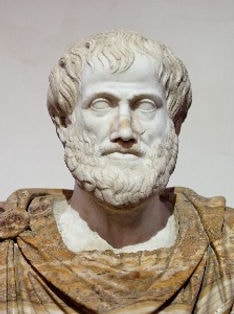
Aristotle was a student of Plato, and his philosophy and ideas continue to impact the way we think today in a profound manner. He proposed as formal rules for correct reasoning the basic principles of the categorical logic that was universally accepted by Western philosophers until the nineteenth century (when Kant and Hegel entered the picture) [10]. Interestingly, Aristotle was also the teacher of Alexander the Great.
Unlike Plato who stressed two realms - the real of forms and the material realm - Aristotle brought the two together by stating that form and matter are two complementary aspects of the world we currently live in. The forms (like treeness) are not contained in some other world, but actually exist within each particular (tree) are can be abstracted from the tree via the powers of the human mind when the mind is brought into contact with the objects of experience.
Like Plato, Aristotle still understood the forms are pure universality (rationalism) and the particulars are pure particularity (irrationalism). The two are then brought together and somehow serve each other, in the irrational-rational synthesis. As with Plato, there is no mention of the Creator and His plan for Creation. Chance is made ultimate, with some fixed principles as its dialectical opposite.
Now, as this article is researched and written as a precursor to the article on the incomprehensibility of God (TBA), it will do us well to observe some more details of Aristotle's philosophy, especially his epistemology. Earlier we mentioned that Aristotle proposed formal rules for correct reasoning that were universally accepted by Western philosophies. For Aristotle, logic has an ontological basis. The ontology that finds expression by means of logic is assumed to be intelligible in the sense of being amenable to a logical statement [11]. For example, when I say 'Socrates is a man', we are asserting of Socrates the meaning of man, whatever it may be (e.g. two-footed animal) [12]. For the operation of any syllogism, Aristotle needs categories ('man', 'lion', etc.) that are perfectly fixed and whose boundaries of definition are perfectly sharp. If perfection fails, equivocation enters (using the same word with different meanings attached to it) and the syllogism collapses.
In doing this, Aristotle was attempting to answer the subjectivism of the Sophists who subjectively stated that what one person calls a man, another may call a mouse and not a man. Hence, the same thing would be both a man and a not-man.
Aristotle was interested in the ontological (real) basis of a man and a not-man. Not the subjective opinions someone brings to bear on the reality they live in.
Now, for Aristotle, the “proper object of unqualified scientific knowledge” he said, “is something which cannot be other than it is.” [13]. Hence, knowledge is of universals only (Since physical particulars of which reality is composed can change, the object of our knowledge cannot be the "particular" (e.g. Fido the dog), but must be of that which is "universal" (dogness - shared by millions of other dogs)).
But, we cannot perceive "dogness". We can only perceive Fido, who is a dog. "Fido" is the particular, and "dog" is the universal. Hence knowledge is not solely accessible via perception but requires some effort from the mind as well to abstract / remove the universal from the particular. Aristotle, therefore, manages to combine an abstract principle of unity with an abstract principle of diversity (form and matter). How is something like this possible? Aristotle did not have an answer. Van Til describes Aristotle's philosophy as a block of ice floating on boiling water - that's basically what you get when you ride the seesaw between rationalism and irrationalism.
The whole of Aristotle’s tremendous effort in his various works is expanded in trying to make sense of the idea that man, on the one hand, has absolute knowledge (rationalism) and, on the other hand, has no knowledge at all (irrationalism). Aristotle was trying to solve the Meno problem, but could not solve it. How is man’s own learning by experience to be made intelligible to himself? It cannot be done by pure rationalism. It cannot be done by pure irrationalism. It cannot be done by overlapping pure rationalism with pure irrationalism, Aristotle’s best efforts and his great vision, notwithstanding.
Cornelius Van Til, The Case for Calvinism.
It should also be noted that the cleverness of Aristotle's form-matter scheme that rides the seesaw between rationalism and irrationalism also makes it impossible for God (if He exists) to reveal Himself to us in any meaningful manner. If human knowledge is absolute knowledge (knowing static universals as intelligible in and of themselves) then there cannot be a god that has deeper knowledge than what man already has, hence God's revelation in Scripture cannot and does not tell us about God at all - the words of Scripture are necessarily human words and nothing more. They can have no deeper meaning than the meaning we attach to them.
Irrationalism-rationalism in Thomas Aquinas*
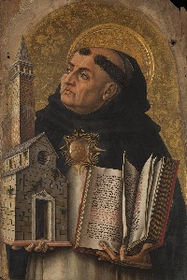
* Aquinas is a Christian most of whose ideas are considered as part of Christian orthodoxy. However, Van Til believed there to be inconsistencies in his thought that ultimately serve to undermine the orthodox elements of his thought. Insofar as Aquinas relied on Scripture to inform his philosophy, he is orthodox. Insofar he relied on Aristotle and neo-Platonism (in isolation from Scripture), he is not. Thomism (the school of thought based on the works of Thomas Aquinas) is making a huge comeback in the 21st century among the Reformed. I believe this might be a knee-jerk reaction against the irrationalism that reigns supreme today (in the forms of liberalism, transgenderism, etc.) as Christians seek an objective grounding for our experience. However, this grounding does not lie in Aristotle or Aquinas - but in the providential control and all-encompassing plan of God.
For Van Til, Aquinas believes in a chain of being between God and the rest of creation. In this system “being” is an abstraction. That means "being" takes on a life of its own which “envelops” both the Creator and the creature. Being is something that is absolute, and as such is shared by both God and man. This is the definition of rationalism that we provided above [14].
Moreover, Aquinas agreed with Aristotle's philosophy to a great extent, adopting his view that knowledge is of universals only, and the form-matter scheme with all the detriments that come with it as discussed in the previous section.
Now, much more can be said and most likely will be said on Aquinas in the coming years as the Thomist resurgence continues. But for now, this will suffice.
Irrationalism-rationalism in Immanuel Kant
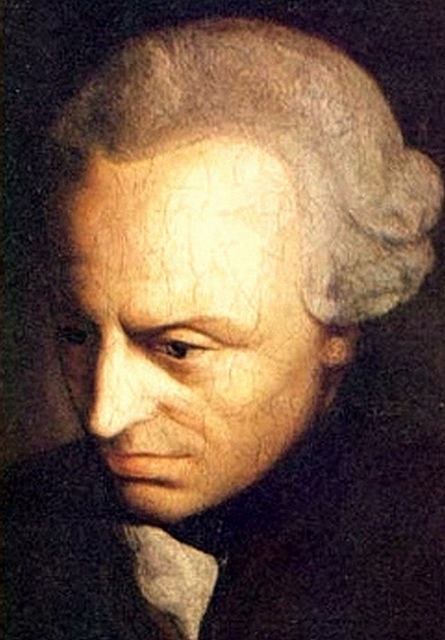
The irrationalism-rationalism synthesis is also very clear in the thinking of Immanuel Kant. Kant, working primarily in the field of epistemology, introduced a distinction between the phenomenal world and the noumenal world. The phenomenal world is the world we are aware of: this is the world we construct out of the sensations we experience. The noumenal world consists of things we seem compelled to believe in, but which we can never know (because we lack sense-evidence of it) [15].
Of the noumenal realm, we can know nothing, hence, Kant was irrationalistic of the noumena. In the phenomenal world, human reason reigns supreme, hence, Kant was rationalistic of the phenomenal. For Kant, the human mind became the source of the categories that supply the structure to the phenomenal world [16]. It should be seen that in Kant's view if God exists He would be completely banished to the noumena. But this is not the God who is manifest in the works of creation and providence. It is not the God who became incarnate in the space-time world and identified himself in it as the Son of God and Son of man. It is not the God who speaks to us directly in the words of Scripture [17].
In short, irrationalism (or pushing all forms of ultimately authority, i.e., God, into an unknowable realm) serves rationalism by pleading ignorance (“makes a universal negative statement “) about time. It knows nothing about the meaning of history (because it does not know God whose plan stands back of history) nor does it know what the future holds (because it knows no God and his plan back of the future). The true meaning and significance of time (whether past or future) is inaccessible to man. Therefore time (whether past or future) only has the meaning that autonomous man would assign to it. That is to give to man’s mind a quasi-divine status, thus breaking down the distinction between the Creator and creature. And that is the heart and soul of rationalism.
James J. Cassidy, How Irrationalism is Rationalism
Irrationalism-rationalism in Jean-Paul Sartre
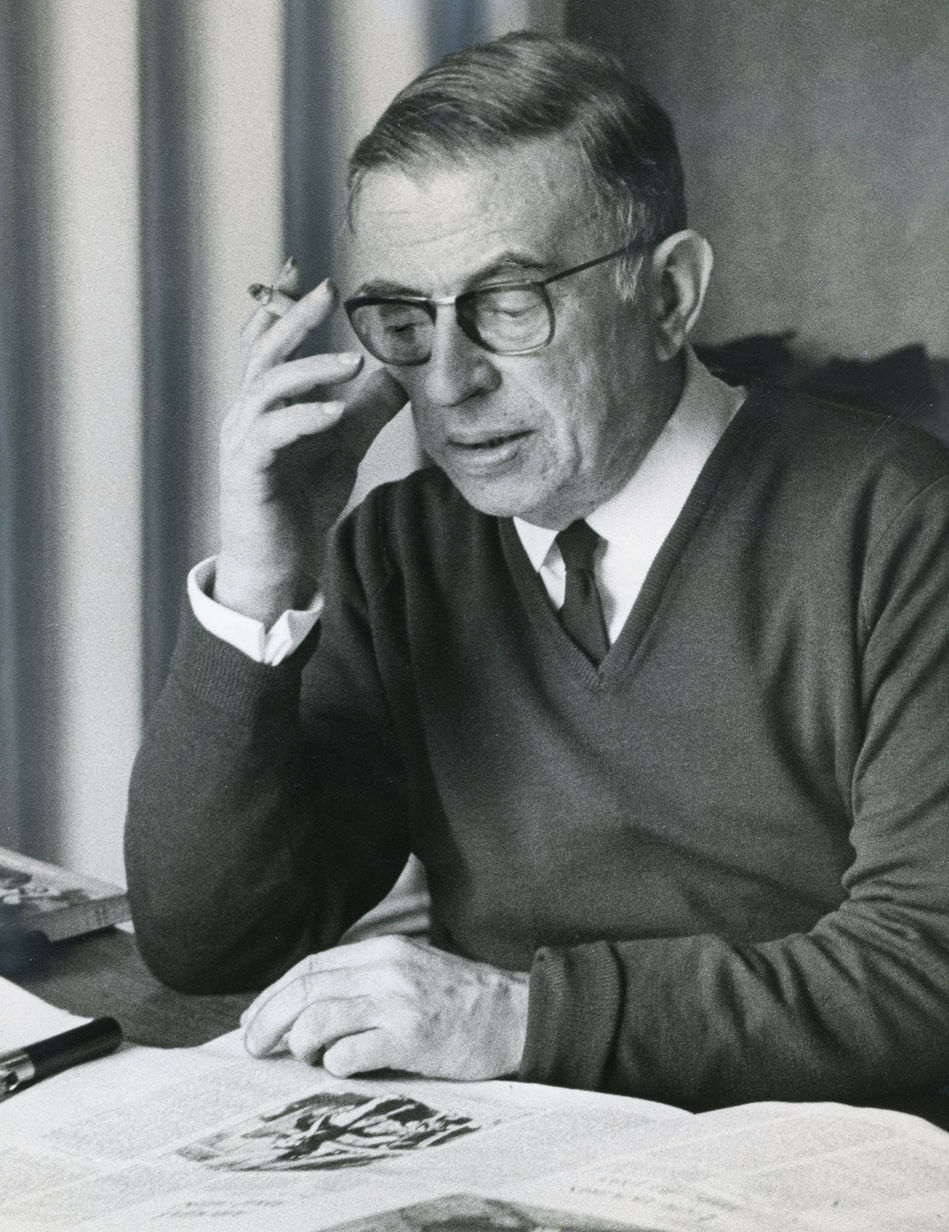
Sartre was what is called an "existentialist". Perhaps the best way to describe Sartre's philosophy of existentialism is with his own example of a "paper cutter". The paper cutter is designed with a particular purpose in mind (to cut paper), and therefore it exists in essence before someone creates it physically. To Sartre, the human who makes a paper cutter because they need to open a letter is analogous to the traditional picture of God who creates people according to the blueprint he has imagined for them.
Sartre believes that, in reality, humans find themselves existing in the world without any blueprint for how to live their lives. Humans have no predetermined essence until they decide on their own purposes and create their own meanings through action [18].
Perhaps more clearly than the other philosophers discussed so far, Sartre's philosophy is built on the self-conscious admission that there is no God, and he embraces utter irrationalism: We are what we want ourselves to be - we (and everything around us) has no place in God's plan. Perhaps Sartre's influential work is what gave rise to the LGBTQ+ movement we see today (where there is no authoritative plan for our lives beyond what we want to make of it. Therefore, believe they have the power can choose their gender, pronouns, etc.).
Irrationalism-rationalism in modern, run-of-the-mill, atheism

Modern atheism perhaps attaches itself more to Sartre's view than it would to Plato or Aristotle (as both these men, although themselves riding the seesaw between rationalism and irrationalism still believe in some kind of god). Modern atheism with its materialism and empiricism believes that reality has no real meaning beyond what we as humans make of it. It all started with the big bang, and it's going to end in fire one day as well. What happens between the beginning and the end is pure chance, and we must make do with the cards that have been dealt with us. This is irrationalism.
A notable characteristic of the new atheist movement is that they are horrible philosophers and loose cannons. Thinking they've brought something new to the table that people haven't thought of in about 6000 years is absurd. There have been more sophisticated forms of unbelief in the past than what this group offers.
Conclusion
Hopefully, the reader can see that the irrational-rational synthesis is a very useful summary of all the non-Christian philosophies that attempt to negate the Christian worldview. It is impossible to argue an unbeliever using the irrational-rational principle into the Christian worldview, as it precludes the Christian worldview (and the possibility of the Christian God existing) from the starting point. If the unbeliever insists on using their principle (which they would in their rebellion) the argument that must take place between the Christian and the unbeliever will sit at this level: The Christian principle of the Creator-creature distinction as basic vs the non-Christian irrational-rational principle. Both parties must assume the other's view for the sake of argument and attempt an internal critique.
It is to this irrationalist-rationalist man that the gospel comes with its doctrine of creation and revelation and its doctrine of redemption through grace in Christ. It is quite impossible to challenge sinners with the gospel of Christ unless this gospel of Christ is set in its widest possible setting, which is full submission to the Lordship of Christ from the start of the reasoning process (Proverbs 1:7, Colossians 2).
It is this which the Reformed faith tries to do. As it tries to do this it must not make compromises on its own principle of the Creator-creature distinction with the unbeliever's irrational-rational principle. To the extent that it does so, it loses its power.
Whether in science, in philosophy or in religion, the non-Christian always seeks for a daysman betwixt or above God and himself, as the final court of appeal.
Van Til, Common Grace and the Gospel, 11
The above quotation was brought to my attention in an article by James J. Cassidy in his article "The Essential Van Til — God not God" (which we also alluded to earlier). It captures the essence of this article perfectly. Cassidy writes:
I love this quote for many reasons. But particularly for its use of “daysman.” It comes from the King James translation of Job 9:33, “Neither is there any daysman betwixt us, that might lay his hand upon us both.” For comparison, here is the ESV translation: “There is no arbiter between us, who might lay his hand on us both.”
I would urge the reader to go and read that verse in context, its quite profound. ... Van Til’s allusion to it is brilliant. God is God and he will not be put on trial by his creatures. And that is the essence of unbelief. Unbelief is the creature putting the Creator on trial by invoking a “daysman” from within the very creation of the Creator to judge Him.
References
[1] Frame M., J., 1995. Cornelius Van Til. P&R Pub. pg. 232
[2] Frame M., J., 1995. Cornelius Van Til. P&R Pub. pg. 232
[3] Reformed Forum. 2022. The Essential Van Til — How Irrationalism is Rationalism – Reformed Forum. [ONLINE] Available at: https://reformedforum.org/the-essential-van-til-how-irrationalism-is-rationalism/. [Accessed 06 January 2022].
[4] Geehan, E. R., ed. 1971. Jerusalem and Athens: Critical Discussions on the Theology and Apologetics of Cornelius Van Til. The Presbyterian and Reformed Publishing Company: Nutley, NJ.
[5] Frame-Poythress.org. 2022. A Van Til Glossary. [ONLINE] Available at: https://frame-poythress.org/a-van-til-glossary/. [Accessed 06 January 2022].
[6] Van Til, and Eric H. Sigward. 1997. The Articles of Cornelius Van Til. Electronic ed. Labels Army Company: New York.
[7] Bosserman, B. A.. The Trinity and the Vindication of Christian Paradox: An Interpretation and Refinement of the Theological Apologetic of Cornelius Van Til. Pickwick Publications, an Imprint of Wipf and Stock Publishers. Kindle Edition.
[8] Van Til. 1969. A Christian Theory of Knowledge. The Presbyterian and Reformed Publishing Company: Phillipsburg, NJ.
[9] A.N Whitehead on Plato | The Core Curriculum. 2022. A.N Whitehead on Plato | The Core Curriculum. [ONLINE] Available at: https://www.college.columbia.edu/core/content/whitehead-plato#:~:text=The%20renowned%20British%20philosopher%20A.N,doubtfully%20extracted%20from%20his%20writings.. [Accessed 13 January 2022].
[10] Aristotle: Logical Methods. [ONLINE] Available at: http://www.philosophypages.com/hy/2n.htm [Accessed 14 January 2022]
[11] Van Til, 1975. Who Do You Say That I Am?. Phillipsburg, NJ: The Presbyterian and Reformed Publishing Company.
[12] Ibid.
[13] Ibid.
[14] Reformed Forum. 2022. The Essential Van Til — God not God – Reformed Forum. [ONLINE] Available at: https://reformedforum.org/essential-van-til-god-god/. [Accessed 14 January 2022].
[15] Very Basic Notes on Kant. 2022. Very Basic Notes on Kant. [ONLINE] Available at: http://people.wku.edu/jan.garrett/303/kant120.htm. [Accessed 15 January 2022].
[16] Frame M., J., 1995. Cornelius Van Til. P&R Pub. pg. 235
[17] Van Til, The Sovereignty of Grace: An Appraisal of G. C. Berkouwer’s View of Dordt.
[18] LitCharts. 2022. Paper Knife Symbol in Existentialism Is a Humanism | LitCharts. [ONLINE] Available at: https://www.litcharts.com/lit/existentialism-is-a-humanism/symbols/paper-knife. [Accessed 15 January 2022].
Discussion